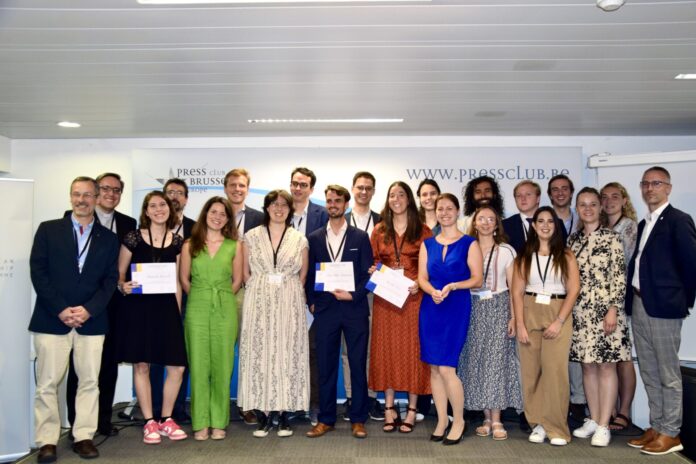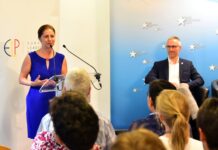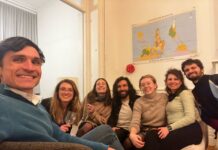Dear Fellows, dear colleagues,
It is always a pleasure to speak a few words at this ELP graduation ceremony on behalf of UCSIA, the University Centre Sint-Ignatius Antwerp, that is a close partner of JESC and a supporter of the wonderful ELP-program. As a University Centre that invests in building bridges between academia, social organizations and civil society, we strongly believe in a holistic formation that connects wisdom, experience and action. Of course, now that you have completed your ELP-fellowship, you will immediately recognize the Jesuit signature. It is an investment, a way of life and that takes time to come to fruition.
I recall a mother who went to her pastor and explained that her son seemed very interested in becoming a priest. She asked what this would require.
The priest began to explain. “If he wants to become a diocesan priest, he’ll have to study for eight years. If he wants to become a Franciscan, he’ll have to study for ten years. If he wants to become a Jesuit, he’ll have to study for fourteen years.”
The mother listened carefully, and as the priest concluded, her eyes brightened. “Sign him up for that last one, Father. He’s a little slow!”
All kidding aside, a Jesuit formation does become a second nature. And especially because it is so strong in making the bridge between the vita contemplativa and the vita activa. And it is on that last aspect, the importance of action, that I want to dwell a little longer. I do so with an analysis of the German-American thinker Hannah Arendt, who was looking for the foundation of a political community.
Her quest was a reaction itself to the position of the French philosopher Jean-Jacques Rousseau. For him, experiencing compassion was a natural feeling. But it was more than just a feeling. Rousseau also saw it as a virtue, even more, a political virtue. The innate aversion we have when seeing others suffer ideally formed the basis for building an entire community for him. That made compassion by far the most important political virtue for him.
Arendt fundamentally disagreed with the Frenchman. Not that she denied the existence of compassion, but for her it could not and should not serve as a basis for building a political community. Real compassion could only be felt with another, individual person. You sympathize with the suffering of one person. It is no coincidence that she sees Jesus Christ as the epitome of this compassion. According to Arendt, suffering with an entire group completely erodes the meaning of compassion. The individual simply disappears. All suffering is lumped together. What does the concrete suffering of someone still represent?
Do you remember the image of the three-year-old boy in his red T-shirt lying dead on the beach, flat on his stomach, washed up after drowning during his flight from terror-stricken Syria on his way to Kos in Greece? I am quite sure. And yet the photo dates from ten years ago. But the image is burned into everyone’s eye. It was the reason for a flood of comments, actions, appeals… Not that it has changed the fate of so many other refugees. Today, because of the many horrible wars, we are inundated with photos of orphaned, emaciated, exhausted and mutilated children from disease, hunger and violence. And by unreal numbers of children who have died. But it does not really touch us (anymore). It is too much. The omnipresence of suffering is paralyzing.
For Hannah Arendt, the private, singular approach to compassion was essential. Because only that form of compassion prompts us to act. Suffering with an entire group flattens us and reduces others to anonymous sufferers whose suffering is interchangeable. If we do take action, we do so out of a kind of misplaced compassion – Arendt speaks in this context of pity – in which we ignore the individual other. They are silenced, we do not listen to his or her story and think we know what to do. There can be no question of genuine compassion.
Arendt had also seen clearly that our compassion is primarily aroused by the wounded and suffering ‘body’: a hungry child, a sick woman, a man mutilated by war violence… But what about the child deprived of education, the oppressed woman and the discriminated man? These forms of suffering are not necessarily visible on someone’s face. They could all too easily be overlooked, while they are of course fundamentally unjust and deserve our compassion.
In order to be able to tackle the invisible, structural forms of suffering and injustice, solidarity is needed as a political virtue, according to Arendt. You need well developed policies to tackle these challenges. But that does not mean that compassion has no role to play. Precisely because it is a natural force, the driving force of compassion has enormous potential. The natural sensitivity to the concrete situation of others moves people, sets them in motion and encourages them to act. But the impulse that emanates from the concrete situation of others only becomes truly politically meaningful if it can be built upon rationally. This requires institutions and policy instruments that are based on rights and not on compassion or charity.
That is something which Robert Schuman e.g. realized very well. The ultimate ideal of a peaceful and united Europe could not be realized overnight. Where would you start? The scale of the challenge is immediately inversely proportional to the ability to actually make that change happen. To make the project a success, small steps are needed. Concrete forms of cooperation that encourage action. That is inspiring, gives courage and does indeed set something in motion.
If I zoom out, I can reformulate that. Concrete, warm forms of solidarity are literally heart-warming and inspiring. But they remain too dependent on goodwill. That is why they must be able to develop into ‘cold’, institutionalized forms of solidarity. This interaction is essential to make action effective and solidarity robust. That work is not finished. But fortunately, there are many examples of solidarity action that can inspire today. And even more fortunate, there is new cohort of ELP-fellows to put our lofty ideals of compassion and solidarity into action! We count on you. Congratulations!
Erik De Bom
Acting Director
University Centre Saint-Ignatius Antwerp (UCSIA)





